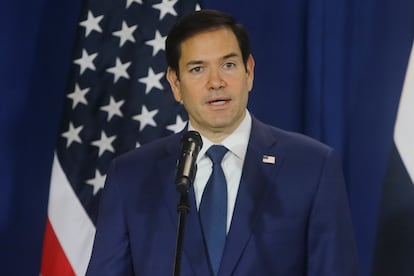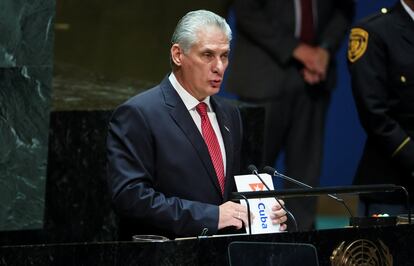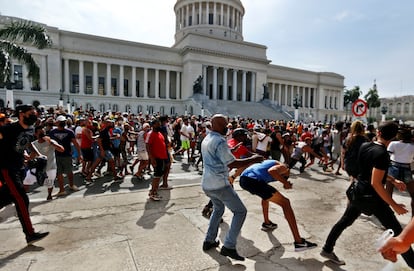Rubio escalates hardline policy toward Cuba, while Havana fails to honor prisoner release pledge
Trump’s decision to return the island to the list of countries sponsoring terrorism halted the release of the 553 detainees agreed to during the Biden administration


The U.S. government’s perks were short-lived: only the six days remaining in the Democratic administration after Joe Biden lifted certain sanctions on Cuba and then handed its future over to the Republicans on January 20. And as was to be expected, on his first day in the White House Donald Trump reversed what his predecessor had belatedly done: he put Cuba back on the list of state sponsors of terrorism from which it was removed in exchange for the release of 553 prisoners, and announced new measures restricting any economic respite, as a way of reestablishing a tough policy toward the island.
To this end, Trump’s cabinet has a key player, a self-confessed opponent of any ties with Havana, the new Secretary of State and Cuban-American Marco Rubio, who in recent statements to Fox News said that he would not set foot in Cuba while the current regime remains in charge, except to “discuss when they are going to leave.”
Since the first days of the Republican administration, Rubio has been putting pressure on the island. In a press release last Friday, he made it clear that his government was reversing any measures taken by Biden that could benefit Cuba, and reported the new sanctions, which represent another economic blow to Havana. Among these is the reactivation of Title III of the Helms-Burton Act, also known as the LIBERTAD Act, which opens the way for Americans to take legal action against companies or people who handle “assets confiscated by the Cuban regime” after 1959.
Rubio also revealed that on January 31 he reactivated the so-called Cuba Restricted List, which prohibits transactions with companies under the control of Cuban military groups, such as the GAESA conglomerate, the business group of the Revolutionary Armed Forces (FAR), which controls a large part of the hotel complexes, hard currency stores, travel agencies, financial services and other areas of the economy. According to the State Department, it is a way “to deny resources to the very branches of the Cuban regime that directly oppress and surveil the Cuban people while controlling large swaths of the country’s economy.”
The U.S. State Secretary also made special mention of the fact that the list includes the remittance processing company Orbit S.A, with which the Cuban government was silently collecting most of the money sent by Cuban exiles to their relatives. At the beginning of December, an investigation by The Miami Herald revealed that Orbit, which apparently operated as an independent and civilian company of the Ministry of Commerce and Foreign Investment, without any apparent ties to military groups, is actually linked to the Cuban military. This was a company created in 2020 to make money transfers through companies such as Western Union viable, after the first Trump administration sanctioned Fincimex. However, it was revealed that it was actually another ally of GAESA.

In his recent statements, Rubio also stated that the “the Cuban regime has long supported acts of international terrorism” and called on the government “to end its support for terrorism, and to stop providing food, housing, and medical care to foreign murderers, bombmakers, and hijackers, while Cubans go hungry and lack access to basic medicine.” In response, the Cuban president said that he was not surprised by “the criminal measures announced to threaten Cuba, a country that does not have a single measure in force against the United States,” he posted on X. “How can anyone claim to want to help the well-being of Cubans with new suffocating measures?” he asked. He also said that the announcement, which he described as “abuse, wrapped in lies” and that seeks “destabilization and domination,” may be the prelude to “other announcements” that the team in charge of the Cuban issue has had ready since 2017 to achieve the “failed objective” of subduing the island.
Accountability for the Cuban regime
In his statement, Marco Rubio said that the State Department plans to promote “accountability for the Cuban regime for oppressing its people and rejects Cuba’s malign interference across the Americas and throughout the world.” He also mentioned that his embassy in Havana has been meeting with relatives of people detained “unjustly” and with dissidents, so that they know that the United States “wholeheartedly supports them.”
Mike Hammer, Chargé d’affaires ad interim to Cuba since November 14, has been seen in several photos touring the island to visit several well-known dissidents in their homes, including the Cuban professor, essayist and historian Alina Bárbara López, who has faced the Cuban government on more than one occasion and has been detained or mistreated by State Security agents on more than one occasion. He also met with the renowned Lady in White Berta Soler; he visited the family of the political prisoner Sissi Abascal Zamora, sentenced to six years in prison for participating in the massive protests of July 11, 2021, and he traveled to Santiago de Cuba, in the east of the island, to visit the home of José Daniel Ferrer, the well-known opposition leader, recently released after the agreements in which the Vatican interceded to release hundreds of prisoners.
And this is, precisely, one of the most controversial issues of recent days. When the Díaz-Canel government was just beginning to release prisoners, Trump returned Cuba to the list of countries sponsoring terrorism and Havana, without making any mention or giving any explanation, stopped the release of detainees, hundreds of whom were behind bars for participating in anti-system protests or for ideological reasons.
Although the government has not offered official lists of the individuals who were released, the independent site Todos Libres reported that 192 prisoners were released after Biden’s decision to remove Cuba from the list of sponsors of terrorism.

Sign up for our weekly newsletter to get more English-language news coverage from EL PAÍS USA Edition
Tu suscripción se está usando en otro dispositivo
¿Quieres añadir otro usuario a tu suscripción?
Si continúas leyendo en este dispositivo, no se podrá leer en el otro.
FlechaTu suscripción se está usando en otro dispositivo y solo puedes acceder a EL PAÍS desde un dispositivo a la vez.
Si quieres compartir tu cuenta, cambia tu suscripción a la modalidad Premium, así podrás añadir otro usuario. Cada uno accederá con su propia cuenta de email, lo que os permitirá personalizar vuestra experiencia en EL PAÍS.
¿Tienes una suscripción de empresa? Accede aquí para contratar más cuentas.
En el caso de no saber quién está usando tu cuenta, te recomendamos cambiar tu contraseña aquí.
Si decides continuar compartiendo tu cuenta, este mensaje se mostrará en tu dispositivo y en el de la otra persona que está usando tu cuenta de forma indefinida, afectando a tu experiencia de lectura. Puedes consultar aquí los términos y condiciones de la suscripción digital.








































